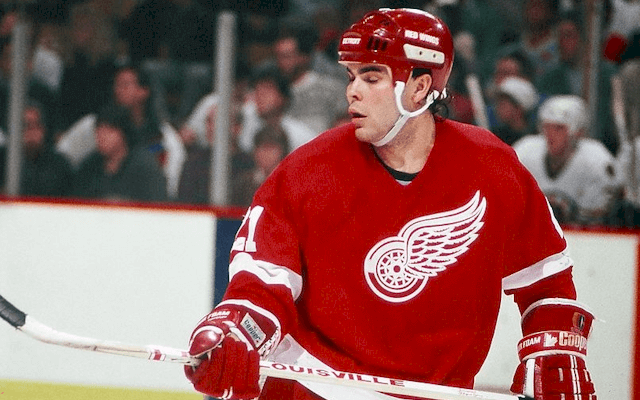
Adam Oates spent his first four seasons with the Detroit Red Wings and went on to a Hall of Fame career.
The NHL released its top 100 players in league history at January’s All-Star festivities, commemorating the 100th year of the NHL. There were 28 players who played at least part of their careers in Detroit on the list of 100. Today: Adam Oates.
The Detroit Red Wings have made it a tradition the past couple of decades.
If they were looking like they needed a boost in search of another Stanley Cup, the Red Wings went out and signed a big-name veteran — maybe one past his prime but perfect to fit into the veteran-laden team in Hockeytown.
During that time, the Red Wings picked up Brett Hull, Mike Modano, Luc Robitaille, Daniel Alfredsson and Chris Chelios, though Chelios played a lot longer than expected.
But there have been a few star players to begin their career with Detroit only to go on to bigger stardom in other cities. It happened quite a bit in the after the 1950s dynasty was broken up, but it hasn’t happened very much in the past quarter century — mostly because the Wings were nearly all veterans at times during their most recent four-cup dynasty.
One of the last big names to begin with Detroit was Adam Oates, one of the best passers in the history of the NHL.
He was signed by Detroit as a free agent in 1985, and at age 23, immediately played in 38 games, scoring nine goals. He then played a full season in 1986-87 and tallied 15 goals and 32 assists. Nothing major, but he was getting better.
His point total rose again the next two seasons with 54 and then 78 — including 62 assists — in his final year in Detroit in 1988-89.
What followed was what ended up being one of the worst trades in Red Wings history.
Red Wings general manager Jimmy Devellano traded Oates and Paul MacLean to the St. Louis Blues for Tony McKegney and Bernie Federko.
It was a trade that had many scratching their heads considering that the Red Wings made the playoffs in the previous three years, two of those reaching the conference finals — only to lose to the Edmonton Oilers dynasty led by Wayne Gretzky and Mark Messier.
Federko and McKegney would last just one year in Detroit. Federko, a Hall of Famer, retired following his first season with the Wings at age 33 and McKegney played just 14 games with the Wings before being traded to Quebec.
Then there was Oates, who again, would become one of the greatest passers in NHL history.
It started with the Blues where he teamed with Hull … Hull and Oates … totally meant to be right?
In his two full seasons with St. Louis, he totaled 79 and 90 assists. Yes, 90 assists. And earned his first two trips to the NHL All-Star Game. Oates had 59 assists with the Blues the following year before being traded to Boston, where he tallied another 20 assists before the season was over.
His first full season in Boston was his masterpiece. In 1992-93, he led the NHL with a spectacular 97 assists. But he proved he could do more than pass. He had a career-high 45 goals — including an NHL-leading 11 game-winning goals. That is a player who could do it all. He somehow finished fourth in the Hart Trophy voting that year.
Oates would finish with 1,079 career assists, seventh on the all-time list. Just 145 of them came with the Wings, as did 54 of his 341 goals.
It was a mistake the Red Wings would have to deal with for 14 more seasons as Oates passed his way all the way to the Hall of Fame.


